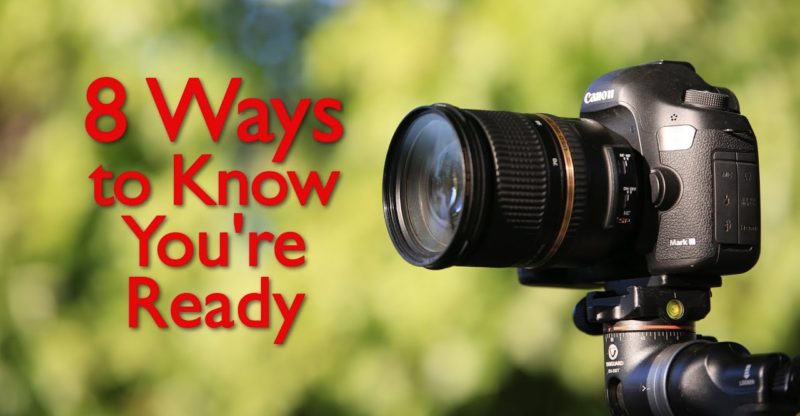8 Ways to Know You’re Ready to Make Money in Photography
Check out our giveaway at the end of the
video. This is a great one. ♪[music]♪ Hi, this is Jay P. Morgan. Today on The
Slanted Lens I'm going to answer a question that was posted to one of our
blog posts. The person asked, "How do I know when I'm ready to make money in
photography or video?" I'm going to answer that question with just one word. A person
has to have a certain level of confidence before they're ever going to be able to
ask people to pay them to take images.
So, if you're going to have confidence, you've
got to do something to be able to gain confidence in your life,
in your photographic life, in your video life.
There a lot of things you can do. You can go to an art school. You
can take classes or seminars. You can go to WPPI or NAB. You can do the things
necessary to be around the industry, to get taught classes and things that will
help you gain confidence. But I know from personal experience.
I went to Art Center
College of Design, one of the greatest art schools in the United States. I
graduated with people who had gone through four years of art school, who had had
photography training every single day, and they still didn't have the confidence that
they could make money in this industry. So here are eight ways that you can gain the
confidence so you can start shooting in the industry. It's not as difficult as
you think. Eight ways to gain confidence so you can start shooting
and making a living. Number one. You're going to need a certain
amount of equipment. You're going to need a camera and a lens. That's it. You're
going to need a camera and a lens. You now should have enough confidence that with
this camera and this lens, I can take a picture and I can get someone to pay me
for it.
That is all the equipment that you really need. You need a camera and a lens.
I have a daughter-in-law who's made money, people have paid her to take images using
her camera, her Rebel and a kit lens. It's really helpful if you have either a laptop
or a computer that you can load your images to, sort them, and post them
online. So, with your camera and a lens, you'll probably need some kind of computer
that you can be able to work on. It doesn't have to be expensive, it doesn't
have to be a Mac. You have to have some way to get your images online to be able
to deliver them to the client. Now you are going to want to add equipment to that
like a great reflector in order to augment the light when you start to work. Or
strobes, or a slider, or things that you can grow and grow and grow. But you don't
have a certain level of equipment you have to achieve before you actually can start
to charge money from people. You will start to make money when you are confident
that with your camera and your lens you can now start taking pictures.
Number two.
You've got your camera and your lens and you're now going to start to
shoot. If you want to photograph children and do portraits then you start taking
pictures of your kids, your friends' kids, your relatives, as many kids as you
possibly can. As you start to do this, you're going to get a body of work. Now
remember, this is a journey, it's not a destination. You want to take as many
pictures as you can and each time you do more and more pictures, they're going to
get better and better. You're going to shoot on a entry level for people around
you. Your friends, your family, a guy you met at work, somebody who's at church.
You're going to take these people around you, you're going to start to photograph
the things they need photographed. You're going to do it for free in the beginning
and you're going to move that into getting them to pay you. That's an entry level
point in the market. You're not going to call art directors with a portfolio of
eight images you just scraped up over the weekend and get a job.
You're going have
to to go after people that are on your level. For me, I started taking pictures
for a guy who had a small design business that he ran out of his house. I took
pictures of mufflers on white seamless for years, but I had to pay the bills. And so
that was my beginning place. I had the confidence, I could shoot these small
little images for him, that gave me more confidence to take larger images, bigger
setups, people and cars, and eventually that just grew. You've got to start with
people you know, so introduce yourself around. Number three is you need a portfolio. Take these images you've been doing of your
children and your friends' kids, and put them all into one body of work online. Go
to Squarespace and start a template portfolio that is very simple but looks
really effective. Get a nice logo for yourself on there and your images and
you've got a portfolio now with the images you've been taking.
Number four.
Don't turn anything down. Don't get this prima donna sense that I
can only shoot certain things. A famous comedian that I photographed time and time
again through the 80's and 90's, had many Showtime specials, told me that the
biggest mistake she ever made was that every sitcom she was ever offered she
turned down because she didn't think it was good enough. In the end, she never did
a sitcom.

And If I told you her name, you'd probably wouldn't know who she is.
Don't turn anything down. Shoot everything. It grows from there. Number five.
Aspire to move up. I did not want to shoot car parts for the rest of my
life, so I had a portfolio of car parts and then I had a portfolio of my large set
production work. I never showed the two to the same people, ever. Car people got the
car portfolio and art directors and the people I really wanted to do this large
set production work with saw my other portfolio.
Today, that translates into two
websites. One for the work that you want to do to make money, and you call that
"Lightning Photography." The other is a portfolio of the work that you want to do
and you call that, Jay P. Morgan Pictures. Put your name on the one that you want
to aspire to and use a name that is just a generic name for the one that is going to
help you make money on your journey.
There's nothing wrong with two different
faces of a company. You can be a high-end commercial shooter and have a wedding
photography business that is very, very active and makes a lot of money. There's
no reason you can't have those two things. Two different names, two different places,
the two worlds never meet. Number six. Spend fifty percent of your
time getting work. You know, if you're going to dedicate a few hours a week to
this or full time to this you've got to spend half of your time trying to get
work. You know, after you check your email, work on your portfolio, clean your
cameras, look at the new lenses, check Fstoppers, check The Slanted Lens, you
think you're working on your business but you're not. So start making calls.
Confidence goes up as you start calling people and talking to them because you'll
find out, you'll get a good response in that process.
On August 21st we have a
free call where you can call in. We're going to give you a daily routine for
success. It will keep you disciplined so you can start making those calls and
getting a return and grow your business. Number seven. Keep shooting and help the clients that you've gained start to grow
with you. In the beginning you may not charge them very much but as you continue
to shoot for them, you want them to start to grow with you. You want them to start
to pay you more and more. As your confidence grows you want to charge them
more for the work you're doing. So they've got to grow with you. Some clients are
going to need to be left behind. You're going to
have to say, "You know what? It's not worth the time
time I spend on this client anymore.
I'm going to go out and get more
clients, better clients that'll pay me more money." But know that your clients
need to grow with you. You can't leave them in the same place or you're
going to leave them behind. Number eight. Find a mentor. Somebody who
is further along in this process that will help you to stay on track and to know the
things you need to do to grow your business. Join a video or photo club,
introduce yourself to people there, find a person that you connect with that will
help you grow your business. The person that when you get a call saying, "I
need to shoot 50 people out on the beach with 100 helicopters." You go, "No
problem, we'll be right there." And you call your mentor going, "I have no idea
what I'm going to do." Someone who will help you get out of binds when you get
into those binds. I've had those times, where I'm going, "I have no clue." But I
have people I can call and say, "Hey, what can I do? How do I make this happen?" So
get a mentor, someone you can talk to about the things you do.
I know people who
have mentors that they share notes once a week going, "This is where I'm at. This is
what I'm charging. This is what I did this week. What did you do?" and they hold
themselves accountable to one another. So find a mentor that will help you stay
busy, stay focused, and continue to grow. The bottom line is you've just got to get
started. You start shooting for people at an entry level, your confidence will
grow, your work will grow, and your clientele will grow. Don't wait. So in
answer to the question, "How do I know when I'm ready to make a living in
photography or video?" You're ready. Start today. Do not wait. I promise you, you
have the ability to do this. You have learned enough, you have enough
experience, you've got enough equipment, it's just time to start doing it. So get
out there and get started. On September 3rd, we're going to start The
Slanted Lens Coaching Class. You know, we truly are going to give you in a 16-week
course where you call in once a week, we're going to give you all of the things
that you need to set up your business, to know the things you need to do to grow
your business, to understand social media, to understand marketing, to understand the
daily routine to be able to make your business grow.
I promise you, join our
Business Coaching Class and by January 1 you will be making a living
in this industry. ♪ [music] ♪ This is not a light blaster. This is a 70
to 200mm Tamron 2.8 vibration control lens. Go to theslantedlens.com. Don't miss
out, this is a great giveaway. You've got until August 31st. ♪ [music] ♪.













